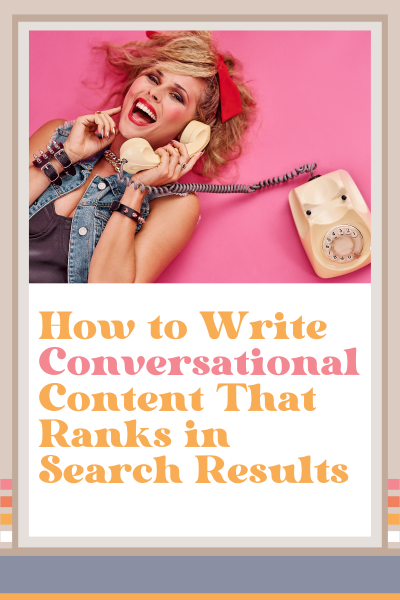How to Write Conversational Content That Ranks in Search Results
Conversational content feels natural to your readers
Let’s face it—most people don’t stick around to read long, complicated articles. So, how do you write something that keeps them engaged and ranks well on search engines?
It’s all about conversational content. Writing in a way that feels natural to your readers isn’t just about tone—it’s also a smart SEO move.
In this post, we’ll break down what conversational content is, why it matters, and how you can start writing pieces that hit the mark every time.
Why Does Conversational Content Work?
Have you ever read something online and thought, “Wow, it’s like this person’s talking directly to me”? That’s conversational content in action. It makes readers feel understood, builds trust, and keeps them reading longer—which, by the way, is something search engines love.
Here’s why it works:
It mirrors real conversations. People don’t talk in formal, jargon-filled sentences.
It’s relatable. Readers can connect with content that feels human.
It’s engaging. When people feel like they’re part of the conversation, they’re more likely to interact (think comments, shares, etc.).
FAQ
Q1: What does conversational content sound like?
A1: It sounds like how you’d explain something to a friend—casual, clear, and easy to understand.
Q2: Do the traditional rules of grammar apply when writing conversational content?
A2: Not really! Writing conversationally means bending the rules a bit. Sentence fragments? Totally fine. Ending a sentence with a preposition? Go for it. Starting with “and” or “but”? No problem. The goal is to make your writing feel natural, not like an English essay. As long as your message is clear and easy to read, you’re good.
Q3: Is writing like you talk bad for SEO?
A3: Not at all! Search engines favor content that’s easy to read.
How to Write Conversational Content That Still Ranks
Keep It Natural and Easy to Read
The best conversational writing feels effortless—like chatting with a friend. To get there, write the way you talk. If something sounds stiff when you read it out loud, rewrite it. Contractions help make your writing flow better (“it’s” instead of “it is,” “don’t” instead of “do not”), and short sentences keep readers engaged.
Jargon can be a major roadblock. If a 10-year-old wouldn’t understand a term, simplify it or explain it right after. This doesn’t mean dumbing things down—it means making sure your audience stays with you instead of bouncing to another site.
Search engines favor this kind of writing, too. Google’s algorithms are getting better at understanding natural language, and AI-driven tools prioritize content that feels human. That’s why content stuffed with keywords or written in a robotic, overly formal tone doesn’t perform well anymore.
FAQ
Q1: How does conversational content help with voice search?
A1: Voice assistants like Siri and Google Assistant pull answers from content that sounds natural. When you write the way people speak—using full sentences and clear answers—your content is more likely to be featured in voice search results.
Q2: Should I still include keywords in conversational writing?
A2: Yes, but they should feel natural. Instead of forcing in awkward phrases, use keywords the way people would actually say them in conversation. This makes your content both readable and search-friendly.
Make It Skimmable (Because AI and Voice Search Love It)
Online readers aren’t reading every word—they’re scanning for the good stuff. That’s why short paragraphs, subheadings, and bullet points are your best friends—these are also great for Google featured snippets. Breaking up big blocks of text makes content easier to digest, which keeps readers on your page longer (a big SEO win).
This structure also benefits AI-powered search features. Google's algorithms—and voice assistants like Siri, Alexa, and Google Assistant—prioritize content that answers questions quickly. When your content is broken into short, clear sections, it’s more likely to be featured in snippets or used as a spoken answer for voice search.
Questions sprinkled throughout your content also help keep people engaged. They mimic the rhythm of real conversation and encourage interaction.
For example:
“Ever wonder why some blog posts rank higher than others?”
“What makes content stand out to AI-powered search?”
This makes your content more relevant to both humans and search engines.
FAQ
Q1: How short should a paragraph be?
A1: Aim for 2-3 sentences per paragraph, max.
Q2: Will short paragraphs hurt my SEO?
A2: Nope! If anything, they help. Google prefers easy-to-skim content, and voice assistants favor concise answers.
Speak Directly to Your Reader (and the AI That’s Reading It)
One of the easiest ways to make your writing more engaging? Use “you.” Instead of talking at your audience, talk to them. It instantly makes your content feel more personal and relevant.
Compare these two sentences:
❌ “This article provides tips for content creators.”
✅ “You’ll walk away from this article with clear, actionable tips.”
The second version makes the reader feel included—like the content was made for them. That small shift can make a big difference in keeping people engaged.
AI-driven search tools also look for content that aligns with user intent. If someone asks, “How do I write conversational content?” Google is more likely to surface a result that says, “Here’s how you can do it” instead of a vague, third-person response. That’s why using “you” isn’t just good for engagement—it’s also smart SEO.
Headlines should also be clear and direct. Instead of vague, overcomplicated phrases, keep them simple:
✅ “How to Write Conversational Content That Ranks”
❌ “An In-Depth Look at Effective Content Development Strategies”
FAQ
Q1: Does using “you” make my writing less professional?
A1: Not at all. It makes it more engaging, which is what readers and search engines want.
Q2: Is conversational writing effective for all types of audiences?
A2: Yes! Whether you’re writing for beginners or experts, a conversational tone makes content easier to digest. The key is adjusting your wording to match your audience’s knowledge level while keeping it engaging.
Key Takeaways
Writing conversational content isn’t about breaking every writing rule—it’s about knowing which ones don’t matter. Keep it natural, make it skimmable, and speak directly to your reader.
And remember: AI and voice search favor content that sounds human. The more natural and engaging your writing is, the better it will rank.
Do you have thoughts to share on this topic? Questions? Drop them in the comments👇
This page contains affiliate links
Like this post?












